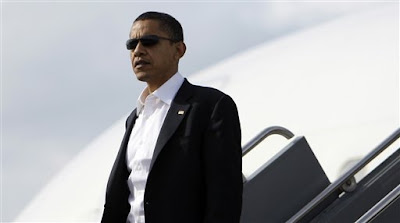 There’s been a lot of talk in the past week about Barack Obama’s demeanor -- his steadiness under pressure-- as the American economy spun in and out of control. There was also speculation that the American public noticed it too, and that his steadiness and reserve were calming and reassuring as they began to get an idea – a positive idea – of what an Obama presidency could be like. His poll numbers rose in some states to double digit leads over John McCain.
There’s been a lot of talk in the past week about Barack Obama’s demeanor -- his steadiness under pressure-- as the American economy spun in and out of control. There was also speculation that the American public noticed it too, and that his steadiness and reserve were calming and reassuring as they began to get an idea – a positive idea – of what an Obama presidency could be like. His poll numbers rose in some states to double digit leads over John McCain.But there was never any mention that as much as Barack’s reserve and discretion were unique to him as an individual, they were also utterly characteristic of the African concept of “coolness.”
Robert Farris Thompson, an art history professor at Yale University, has spend his academic career tracing the roots of African aesthetic traditions in the art and music of North and South American and Caribbean cultures. Flash of the Spirit, probably Thompson’s best known book, published in 1983, was the first to explore the African concept of coolness. (If you have any kind of interest in American culture, it is a must read. There is no way to understand American music -- blues, jazz, rock and roll -- without understanding that it is as much African as it is American. Maybe even more.)
Robert Farris Thompson, an art history professor at Yale University, has spend his academic career tracing the roots of African aesthetic traditions in the art and music of North and South American and Caribbean cultures. Flash of the Spirit, probably Thompson’s best known book, published in 1983, was the first to explore the African concept of coolness. (If you have any kind of interest in American culture, it is a must read. There is no way to understand American music -- blues, jazz, rock and roll -- without understanding that it is as much African as it is American. Maybe even more.)
The core concept of coolness, as a modern day elder of the Yoruban tribe described it to Thompson, is that “coolness is a part of character, to the degree that we live generously and discreetly, exhibiting grace under pressure.”
This idea is uniquely African, and is expressed in the languages of many African tribes. In Yoruba, the word is itutu, which Thompson characterizes as a kind of “mystic” coolness. In Luo, the tribe of Obama’s Kenyan father, the word is mokue΄, which means cool, quiet, and peaceful. Thompson has traced the concept’s origins to at least as far back as the fifteenth century in Africa.
The African concept of coolness is different from the Western concept of coolness, as in icy determination or “sang-froid,” (translated literally from the French as cold-blooded). The Western concept is a much simpler expression of a steely, perhaps even amoral, character. The African concept is highly moral, an all-embracing idea of detachment and calmness that is both emotional and intellectual. Someone who possesses itutu or mokue΄ is reassuring to the people around them because they are able to be nonchalant and in-control in situations where emotionalism or eagerness would be natural and expected. Think John McCain cancelling his campaign before the Senate vote on the bailout. That is not cool.
If you want to listen to what cool sounds like, listen to the perfect combination of desire and restraint in the tunes of Miles Davis’ Kind of Blue.
And if you want to see what it looks like in art, here is a 12th century Yoruba bronze head from Ife, Nigeria. The composure of the face, the inner stillness and control it expresses – its sense of repose and assurance -- is quintessentially cool.

While I was poking around the Internets, I discovered that Thompson has a new book coming out at the end of the month. Aesthetic of the Cool: Afro-Atlantic Art and Music
It’ll be on my reading list. Put it on yours too.
Andrew Sullivan talks about this too, but without the African context.

2 comments:
So interesting! And so well written (big surprise). I will pass along this link to many. It's nice to have smart friends. You should submit this to the Huffington Post. Which reminds me, did you read the article about Arianna in this wk's NYorker? The thing I admire most about her is her seemingly unquenchable thirst for knowledge.
Of course I agree with everything Pam said - and she sent me here b/c she knew I'd appreciate it. Yes, submit it to HuffPost or DailyKos and then tell me how that works. I wrote today about gardening and politics on GardenRant and think it might also have legs if I promoted it somehow.
Alien in McLean? I commented on my Rant post about being a Southerner at ultra-lib Oberlin College in '67. Alien indeed.
Post a Comment